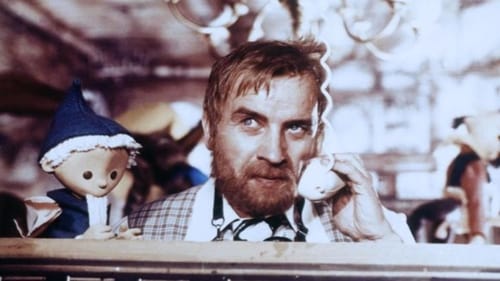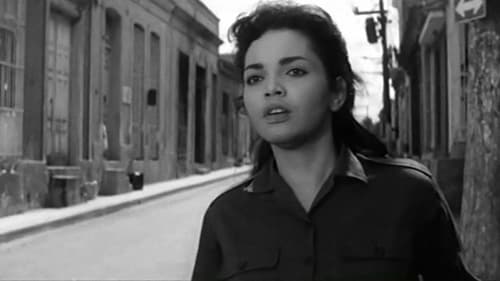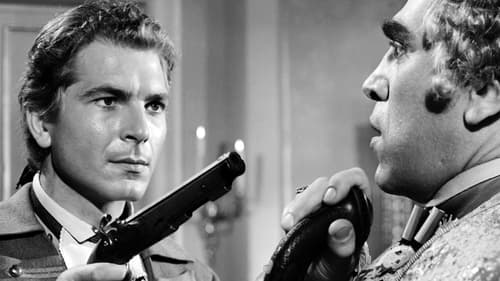
Cinematography

Writer
Television film based on a short story by Christa Wolf.

Cinematography
Television film based on a short story by Christa Wolf.

Cinematography

Writer

Cinematography
Film by Ulrich Thein.

Director of Photography

Cinematography
Everything changes for fifteen-year-old Heinz Stielke, a fanatical member of the Hitler Youth, when he learns that his father, who died as a war hero, was actually Jewish. Heinz is forced to leave school, loses his friends, and worst of all, his mother dies in a bombing raid. A kind-hearted police officer tries to get him a place at an orphanage in Thuringia, but on the way there, he is picked up by the SS and sent to a training camp.

Cinematography

Cinematography
Ten days in the life of socialist politician Clara Zetkin. In August 1932, she is summoned from Archangelskoje near Moskow to open the new legislative session because at seventy-five, she is the oldest representative in the German Reichstag. Although she is ill and almost blind, she see this as her chance to make her voice heard amid the growing Nazi influence in Germany.

Cinematography

Writer

Cinematography
Biggy is 18 years old and getting trained as a salesperson. She lives in a small town. In a greenhouse she meets Wolle, a 20-year-old locksmith. The two get closer and fall in love but their wild life comes to an end when Biggi tells Wolle that she is pregnant. Since Wolle dreams about freedom and adventures, he flees from the responsibility, starts to work in another town and gets involved with another girl. Thereupon, Biggi gets an abortion and starts to study at the university. She also becomes acquainted with another man, but soon breaks up with him. Since Biggi and Wolle are unhappy without each other, they get back together and start anew.

Cinematography
While studying in Moscow, the GDR resident Christiane falls in love with Hatem, a fellow student from Syria. The two become a couple and even have a child together. When their study draws to an end, Christiane and Hatem have to decide if they want to share their future together. After Hatem explains to Christiane that as a woman she will not be able to work in Syria, Christiane suggests moving to the GDR together. For Hatem, however, this is out of the question, since he considers it a betrayal of his country. Thus, the two young people are forced to go separate ways.

Writer
While studying in Moscow, the GDR resident Christiane falls in love with Hatem, a fellow student from Syria. The two become a couple and even have a child together. When their study draws to an end, Christiane and Hatem have to decide if they want to share their future together. After Hatem explains to Christiane that as a woman she will not be able to work in Syria, Christiane suggests moving to the GDR together. For Hatem, however, this is out of the question, since he considers it a betrayal of his country. Thus, the two young people are forced to go separate ways.

Director of Photography

Writer

Cinematography
Ralf Paeschke is a film student who has to make a documentary film about a group of women working in a lamp factory. There is brazen Susie, mischievous Kerstin, lonely Anita, single Ella, withdrawn Gertrud and the imposing forewoman. When Kerstin is suspected of stealing, tension among the women mounts. Ralf demands that things be clarified, and his film plays an unexpected role in the matter.

Writer
Ralf Paeschke is a film student who has to make a documentary film about a group of women working in a lamp factory. There is brazen Susie, mischievous Kerstin, lonely Anita, single Ella, withdrawn Gertrud and the imposing forewoman. When Kerstin is suspected of stealing, tension among the women mounts. Ralf demands that things be clarified, and his film plays an unexpected role in the matter.

Cinematography
On April 1st, single mother Maria and her ten-year-old son Micha move into a new apartment located in the Berlin district Marzahn. On the very first evening, Maria gets an invitation from her neighbor Alvaro, a political emigrant from Uruguay who keeps working for his country’s Communist Party while staying in the GDR. Maria and Alvaro fall passionately in love. Even Micha, who is suspicious of Alvaro in the beginning, eventually becomes friend with him. Thus, nothing stands in the way of their happiness – except for the certainty that Alvaro will have to leave as soon as he gets a new assignment.

Cinematography
A flamboyant comedy about love, work and money—revealing that the "planned" economy produced some unconventional entrepreneurial methods.

Director of Photography

Cinematography
Film by Horst E. Brandt.

Director of Photography

Cinematography
East German film about the history of Red Orchestra, a real life German pro-Soviet spy ring created after the rise of Hitler that turned into a resistance movement led by a leftist Nazi officer, Harro Schulze-Boysen, and Arvid Harnack.

Cinematography
Electronic data processing is an absolute must in the Information Age. Karl Hoppe, the director of a large plant, is aware of this need for modernization and hires mathematician Dr. Jochen Bernhardt to install computerized systems which are supposed to calculate ways in which the plant could be run more effectively. Dr. Bernhardt is so focused on efficiency that he forgets about the human side of work, causing his girlfriend to leave him and several dissatisfied employees to quit their jobs.

Cinematography
A depiction of class conflicts in Germany between 1918 and 1945. The Spartacist Erwin is shot by officers in 1918, and his pregant working-class bride Marie begins a new relationship with social democrat Geschke. Erwin's son Hans grows up to be a communist like his father, leading to bitter hatred between him and his Nazi step-brother, while Geschke becomes increasingly resigned to the political situation in Germany.
The three aristocratic officers who shot Erwin many years ago meet again during the Kapp Putsch, but their support for the Third Reich eventually leads each to their deaths.

Writer
A depiction of class conflicts in Germany between 1918 and 1945. The Spartacist Erwin is shot by officers in 1918, and his pregant working-class bride Marie begins a new relationship with social democrat Geschke. Erwin's son Hans grows up to be a communist like his father, leading to bitter hatred between him and his Nazi step-brother, while Geschke becomes increasingly resigned to the political situation in Germany.
The three aristocratic officers who shot Erwin many years ago meet again during the Kapp Putsch, but their support for the Third Reich eventually leads each to their deaths.

Cinematography
The puppet boy Turli, who was only recently been carved from wood by the toymaker Kasimir, suddenly springs to life. Turli has nothing but nonsense on his mind and wreaks chaos everywhere he goes, although he is actually supposed to attend school.

Cinematography
In November of 1939, the British consulate in Norway receives documents saying that the Nazis are conducting secret rocket research in Peenemünde. But the British doubt the authenticity of the so called "Oslo report". Thus, the Germans continue their experiments unimpeded. At the same time, resistance groups from France, England, Poland, and Germany try to find and to sabotage the secret Nazi research base. When the first "V 2" rocket is successfully launched, the Allied commanders finally become interested in the "Oslo report".

Cinematography
Fritz Weineck, a worker′s son from Halle, loves music – and dreams to make a living out of it one day. When his friend Alfons, a World War I veteran, gives him a trumpet as a gift, Fritz seems to come closer to fulfil his dream. But then, Fritz realizes that after the end of the German empire workers still have to desperately fight for their rights, and decides to use his instrument for political means: At a meeting of militant workers, he uses his trumpet as a signal horn. But Fritz suffers a severe setback when a comrade dies in the fight for an arms depot because of his fault.

Director of Photography
„White mouse“ Fritz controls the traffic on Dresden’s Körner Square. Helene, who crosses the junction on her motor scooter every day, has taken a shine to Fritz a long while ago. Although Fritz yields right-of-way to her remarkably often, the two have not spoken to each other. In order to finally get to know him better, Helene deliberately performs a traffic violation. Her plan is working: She is ordered to take road safety education lessons from Fritz and they get closer. New problems arise in the shape of Mrs. Messmer who must pay a monetary fine. She feels discriminated against by Fritz and complains about him to his supervisor.

Director of Photography
Daniela – a single mother, whose boyfriend left for the US – believes wholeheartedly in Cuba's revolutionary new order. Meanwhile, in Florida, a plot is afoot. Under the command of an American officer, four Cubans ex-patriots and a Guatemalan land on the Cuban coast to prepare a US invasion of the island. Daniela's superior, the corrupt Cuban officer Palomino, is secretly helping the invaders and the young woman becomes entangled in the intrigue.

Director of Photography
Bundeswehr soldier Klaus’ regiment is stationed in France, to take part in NATO maneuvers. The soldiers are ordered to be kind to the populace, since the West German High Command wishes the French to forget the atrocities that were committed during the Second World War. Klaus falls in love with Jeanne, the daughter of the local mayor. He discovers that his commanders intend to demolish the ruins of a local church, in which civilians were murdered by the German occupation forces at 1944. A local journalist who researches the event discovers that West German General Rucker ordered the massacre, but he is mysteriously murdered. Klaus defies his commanding officer Siebert, who instructs him to steal the documents indicting Rucker, and hands the evidence over to Jeanne.

Cinematography
Film by Richard Groschopp.

Cinematography

Director of Photography

Cinematography

Cinematography
Ferdinand is an army major and son of President von Walter, while Luise Miller is the daughter of a middle-class musician. They fall in love with each other, but both their fathers urge them to end the affair.

Cinematography
Film by Johannes Arpe.

Camera Operator
Film by Václav Gajer.


















